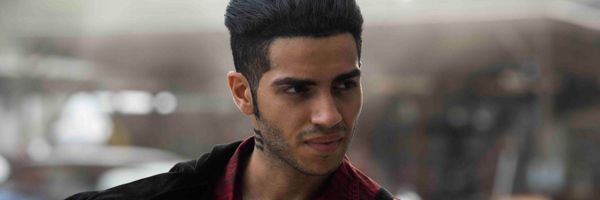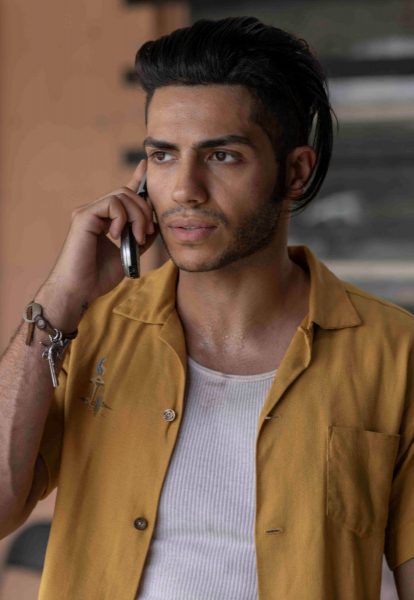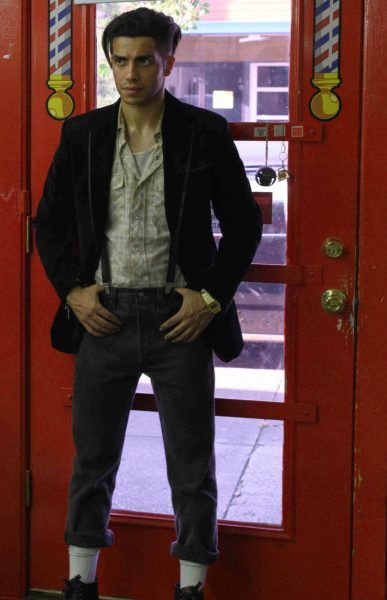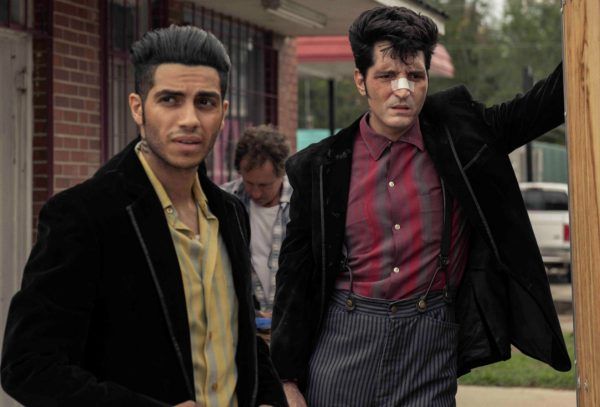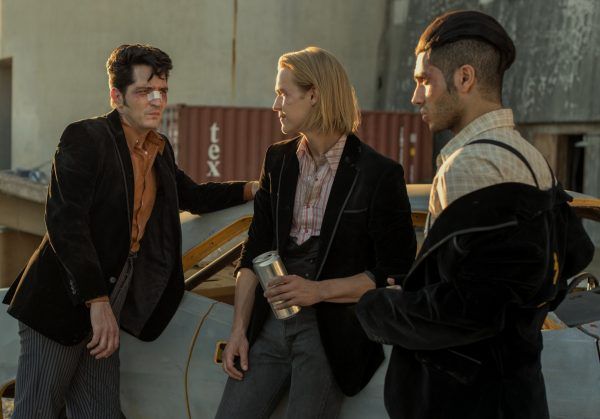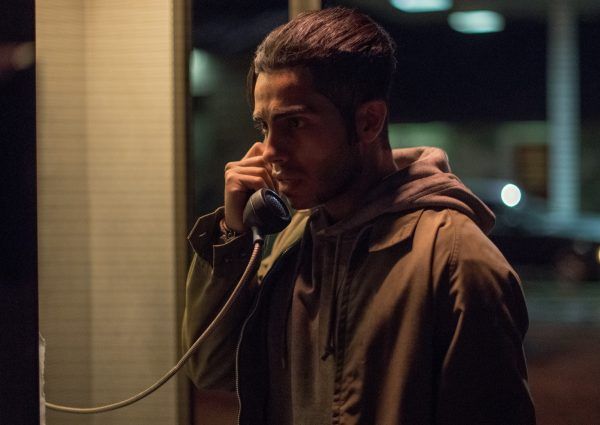From show creator Josh Corbin, the Hulu drama series Reprisal is a noir that follows a femme fatale (Abigail Spencer) who, after being left for dead, reinvents herself and sets out to take revenge against those responsible. With her plan in motion, a determined Katherine Harlow, who now goes by Doris, will be forcing everyone to choose a side.
During this 1-on-1 interview with Collider, actor Mena Massoud (who plays Ethan, the newest member of the gang known as the Banished Brawlers) talked about why Reprisal was such an appealing project to him, the success of Aladdin and how that’s impacted his career, the switch of going from a film set to a TV set, how he found this character, what he’d like to do next, and the filmmakers he’d love to work with.
Collider: This will be the first thing people will be seeing you in, since Aladdin. Did you know that, at the time, and was that something that made you want to do this, specifically?
MENA MASSOUD: Yes, that’s why I took it. TV is changing a lot. I was very hesitant to take a TV series ‘cause it’s such a long commitment, but TV is changing. We’re seeing more and more stars go off and do TV. Nicole Kidman, Reese Witherspoon, and tons of movie stars are going off to do TV. So, for me, it was more about focusing on character and doing something as different as possible from Aladdin, that was available to me. And Josh [Corbin], the showrunner didn’t even know who I was, when I auditioned for this. The studio was like, “I know you like him, but we have to get approval from Disney.” And he was like, “Disney? Why?” They were like, “He’s playing Aladdin.” And he was like, “What are you talking about? That’s a cartoon?!” So, we knew, and it was planned.
Was this a project that was very different from anything else that had come your way?
MASSOUD: Yeah, it was the best thing I read. I went through a process to get this. It wasn’t offered to me. They didn’t approach me about it. My team went out and found it, and I had to audition, like everybody else. But I remember reading the script and telling them, “This is the best script that I’ve read for TV, in two years.” It was very different. And at the same time, the character’s name is Ethan Hart, and it was written for a Caucasian or ethnically ambiguous person, so that attracted me to it, as well. With Aladdin, it’s very specific, and I wanted to do something that wasn’t.
When you did Aladdin, were you worried you’d get typecast?
MASSOUD: A little bit, but I thought about Michael Keaton with Batman. Any actor playing an iconic character has to worry about that. But Christian Bale is a great example of it. I don’t think anyone thinks of him as Batman. He did a really good Batman. For a lot of people, he’s their Batman. But he’s such a good actor and does such different things that there’s no way you could ever say, “Christian Bale only did Batman.” So, I was aware of it, but I think I’m young enough that, in a few years, I can direct the thought process of what people think of me.
Was it also fun to have such success with that movie, especially knowing that it’s now a billion dollar Disney movie?
MASSOUD: Yeah. Before the film even came out, I was going around telling Naomi [Scott], Guy [Ritchie] and Will [Smith], “This is so exciting! We have a chance at a billion dollars.” And a lot of them were like, “No, we’re not gonna get there. They might not have marketed us as that kind of movie.” So, it’s amazing to see it do that success. In a really funny way, the movie represents how I’ve been looked at, my whole career, so far, which is as an underdog. Nobody ever thought it was gonna do a billion dollars. They were like, “Yeah, it’ll do well, but it’s not a billion dollar movie.” I like being the underdog. I like proving people wrong, and I think we did that with [Aladdin]. A lot of people saw more than once. And there’s a big difference between making a billion and doing 300 million in China, and doing 53 million in China, which is what we did. We did not get any money from China, and still hit that mark, which is pretty significant. I’m glad we got it now because I think it’s going to become a more and more common thing, with inflation. I think five years from now, there’ll be more billion dollar movies than we’ve ever seen before, so I’m very blessed.
What was it like to go from being on the Aladdin set to being on the Reprisal set?
MASSOUD: It’s a switch of mind-set because, in a film, you’re creating a character arc that lasts two hours. In a series, if the series is successful, you’re creating an arc that lasts five seasons, which is like 50 hours. So, it’s very different. You’re pacing things out very differently. It’s a very different creative process.
As the viewer, it takes awhile to learn what’s going on with your character. Did you know more about that, before starting?
MASSOUD: I knew what the character was going to be doing, where he came from, his origin story, and what he was getting into. Obviously, later down the line, Josh, who basically has created this world for the past five years, in his head, has a five-season arc. He knows what the story is going to be, so he sat me down and walked me through all of that. But when I was first auditioning, I knew a little bit more than the audience does, but not a ton. I think that this series will either do really, really well, and people will catch on and fall in love with it, or it’ll go away very quickly. I don’t think there’s an in the middle, on this kind of show. There’s so much to absorb and so much to get right that, if you get it right, it pays off, in the long run, but if you don’t, it goes away very quickly. It’s expensive.
Then how did you find this character, when you weren’t fully sure who he is and what his relationships are?
MASSOUD: You live in the moment. The most important thing is to know his past relationships, and what has affected him and shaped him, as a character. In a really cool way, we were all waiting for the scripts, and that’s really refreshing because that’s real life and that’s what your character is going through. They don’t know what’s gonna happen tomorrow, and they don’t know what’s going to happen the day after, so it’s freeing, in that way.
What can you say about who Ethan is and why he gets thrown into this world?
MASSOUD: Other than Doris/Katherine, who’s played by Abigail [Spencer], he’s the only other character that connects the two worlds together. He comes from the worlds that Abigail’s character is now a part of, which seems like 1990s Detroit. But then, he transitions over into this other world that we know nothing about, that we’re discovering and that Katherine used to be a part of. So, he lives in the middle of these two massive worlds, and he’s really the only person that’s connecting them. I don’t want to give too much away, but you find out, very quickly, how he connects these two worlds and how he connects Katherine with the 3 River Phoenixes, the Banished Brawlers, the Pin-Up Girls, and all of these people. And he’s in a very dangerous situation, as well.
Is it fun to be a part of a world that has its own look, feel and language?
MASSOUD: Yeah. A lot of us feel like we’re basically creating Game of Thrones, without the novels. At least with Game of Thrones, they had the novels and they had George [R.R. Martin] there to work it all out. With us, we’re creating a massive world, with a lot of characters and a lot of settings. They have their own chocolate bars, they have their own cigarettes, and they have their own drugs. You’re a part of this world that’s being created, as you go.
Does it then become about trusting in your creator/showrunner?
MASSOUD: Yes, it’s a lot about trust with Josh, our directors and the producers, but more Joss than anybody. The directors are coming in and directing an episode or two, and then they’re leaving, so they really know as much as we do. Really, it’s a lot of trust with Josh, for sure.
How have you found the experience of working with different directors?
MASSOUD: In a way, it’s empowering because they can come in and have a different style and way of working, so it freshens things up a little bit. But at the end of the day, they don’t know your character as well as you do. Whereas for a film, for example, me and Guy [Ritchie] down and talked about the character, and we talked about what it means to be a young person going through this without a mother and a father, and basically being an orphan. You start that conversation, but you also end it. But with TV, you start that conversation with Jonathan van Tulleken , the director of our first three episodes, but you end it with someone else. So, it gives you a sense of empowerment because you’re really the only person that knows the character as well as you do, and also a sense of play ‘cause you get to do different things with them. They have a different way of working, they have a different style, and they trust you, on different things. With a film, you have to have that relationship with the director.
Because these characters are constantly evolving, did you have a moment where you felt like you really got who he is?
MASSOUD: It’s definitely an ongoing evolution. It’s different from film, in that way. With Aladdin, I knew who he was, I knew where he ended up, I knew his arc, and I knew what was going on. With this, it’s different because you get every script and it changes, even for Josh. He’s mapped things out in his head, but sometimes, we’ll do something in one episode and we’ll teach him about the character, from what we’re doing. So, I’m always learning. I couldn’t tell you that I’ve figured Ethan out, or that I know completely who he is or where he’s going, or if he’s gonna change. I can’t tell you that.
Who are the characters that are important to Ethan and that are in his world?
MASSOUD: The characters that he’s interacting with, on a day to day basis, are the 3 River Phoenixes, Rodrigo Santoro’s character, and a few others. With everybody else, we don’t know. They might be there one episode and gone the next. We don’t really know, and that’s already happened.
Are you starting to think about what you want to do next?
MASSOUD: Yeah, definitely. Honestly, I loved the responsibility on Aladdin, leading that film, working the most days, and having to learn the amount of things that I learned. I liked leading a film, in that way, and I would like to do that again. My hope is that there’s a big franchise out there, that wants to meet to give it a shot, like I did with Aladdin. I like that responsibility. A lot of people don’t. When you talk to a lot of actors, who are in those big movies, they don’t like it. I really enjoyed it. It’s a lot of responsibility, and I’m a different human being, from when I started on Aladdin to when I ended. I changed as a person. I grew a lot and learned a lot about myself, and I want to continue to do that. I think that’s a good platform to learn. Also, I wanna do little cool, artistic films, like Ryan Gosling does, or like Jake Gyllenhaal does. I look up to those guys, and I think one thing they do really well is balance both things. They go off and they do the art house stuff, and they go off and do Broadway, but then they come into film and can lead pretty significant films. And a biopic is something else that I wanna look into doing. I wanna delve into playing a real person. That’s a challenge, for an actor, playing a real person. There are lots of things that I wanna do. We’ll see what happens. A lot of people have misconceptions in their head about actors who get to play things like Aladdin. They’re like, “He must’ve made a lot of money. He must be getting offers, up the ass.” I can tell you that none of that is true. Not even some of it. I haven’t had a single audition since Aladdin came out. So, we’ll see. It’s exciting. We’ll see what happens.
How do you feel about the whole audition process?
MASSOUD: You get to a point in your career, which I’m not at yet, where you don’t have to do that anymore. But I feel like you have to earn it, and I understand that. I haven’t earned that yet. I completely get it. I have no problem going in and auditioning. The challenge for a struggling or hustling actor has always been just getting auditions and getting in the room. Just give me a shot at it. When I first saw the general audition notice for Aladdin, I just wanted a shot at it. I don’t want to self-tape because someone might not see it. I’ve done plenty of self-tapes where I can tell you, hands down, nobody ever saw it. I just want a shot at it. That’s all I’m asking for. I hope that a billion dollar movie will get me in the door to audition. That’s all I’m hoping for. It’s crazy. It’s crazy that that’s what I was hoping for, when I’m serving at a restaurant, and that’s still all I’m hoping for.
Are there specific filmmakers that you’d love to work with?
MASSOUD: Oh, yeah. For me, more than ever, I feel like I wanna work with these people before they retire. [Quentin] Tarantino keeps talking about how wants to get to 10 [movies], and then quit, which means his next one is his last one. So, I’m like, “What is it? I wanna do it.” I wanna work with Paul Thomas Anderson, Wes Anderson, and Martin Scorsese. I don’t know how many more films Scorsese is gonna direct. And then, there’s another tier of guys who are still as prominent, but I know that they have a few more films in them, like [Steven] Spielberg and Christopher Nolan. So, right now, it’s just about wanting to work with those guys before they’re done directing anymore. That’s a generation of filmmakers who I would die to work with, before they’re not gonna do it anymore. No one’s ever gonna replace them. No one is ever gonna replace Tarantino. No one’s ever gonna replace Scorsese. That’s just not gonna happen. And once they decide they’re not doing it anymore, it’s done. I would love to work with Al Pacino because once he’s done, he’s done. That’s it.
Reprisal is available to stream at Hulu.

